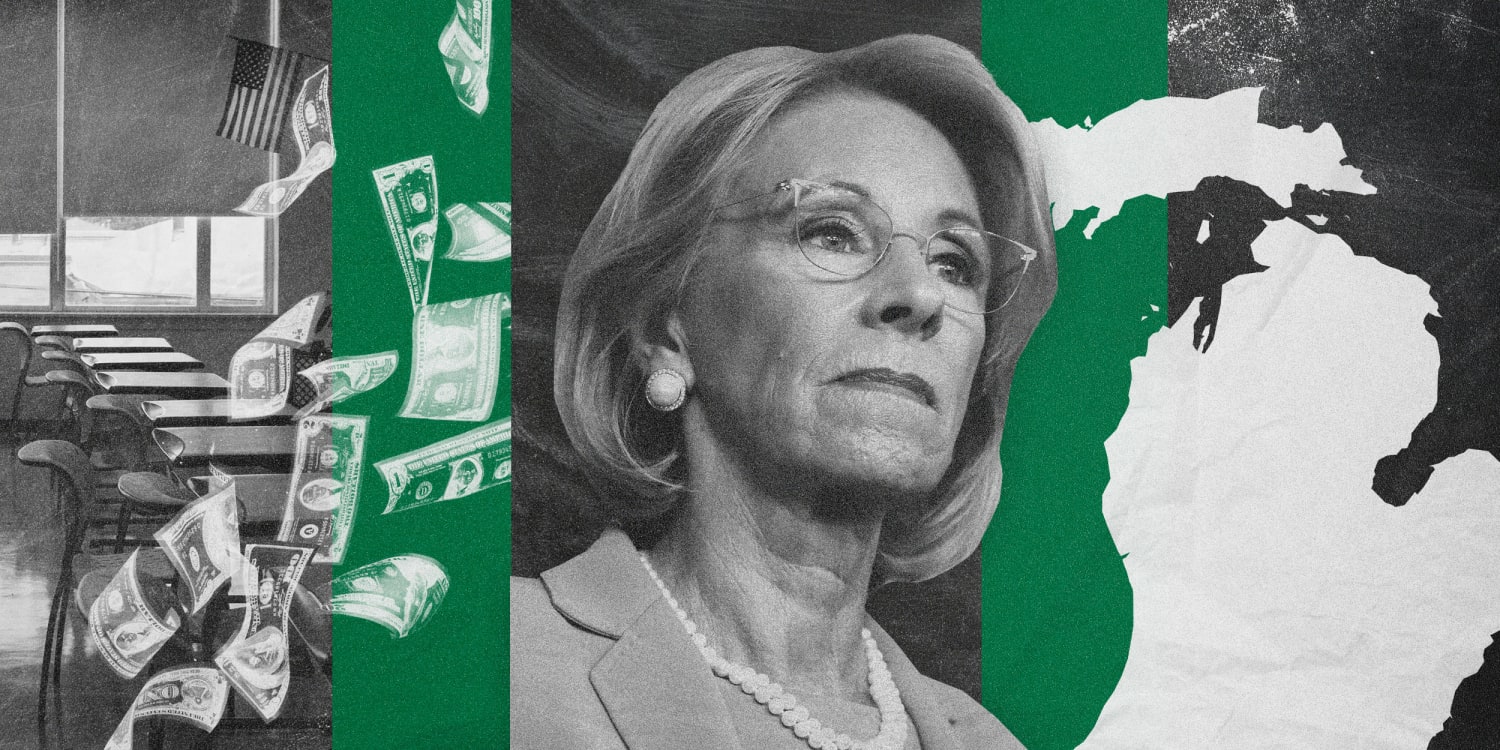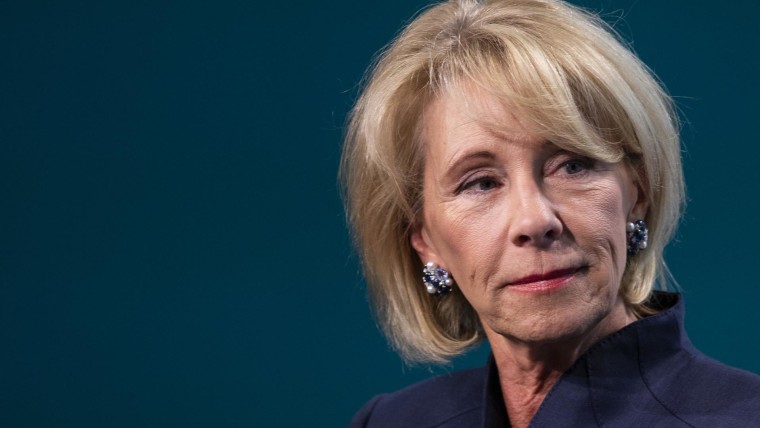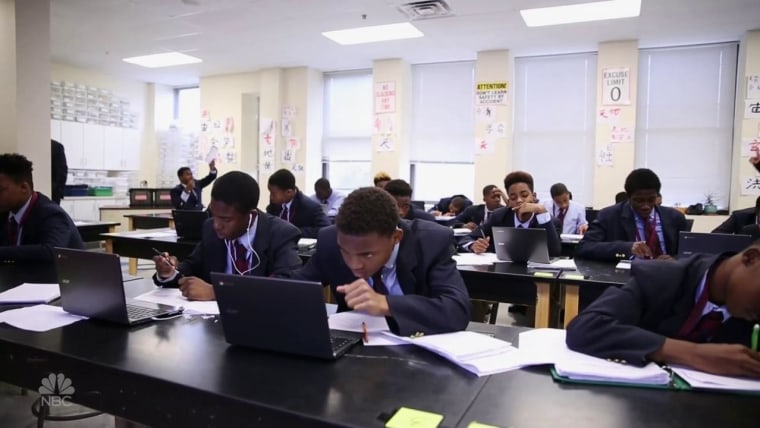DETROIT — After spending millions of dollars on a goal that has so far eluded her, Betsy DeVos might finally have found a way to achieve it.
The wealthy philanthropist from western Michigan who served as U.S. education secretary under former President Donald Trump has been fighting for private school vouchers in her home state since at least 2000, when she and her family put about $3 million behind a ballot referendum that was soundly rejected by voters.
She spent the next two decades spending heavily on campaign contributions and lobbying efforts to promote alternatives to traditional public schools. DeVos and her allies have succeeded in making Michigan one of the nation’s friendliest states for privately run, publicly funded charter schools. But her vision for a state program that would make tuition-based private schools more affordable for Michigan families has repeatedly run up against the state’s strict constitutional prohibition on public dollars for these schools.
Now, however, Michigan is among many states where the surge of anti-government activism that emerged during the pandemic has combined with a conservative shift in the federal courts to fuel what experts say could be an unprecedented expansion of voucher programs, which give parents money for private school tuition or other educational expenses. Supporters hail vouchers as “parental choice,” while detractors deride them as harmful to public schools.
Seventy-four measures have been introduced in state legislatures this year to create or expand voucher programs, said Robert Enlow, the president and CEO of EdChoice, a national organization that supports vouchers and other alternatives to traditional schools. And supporters of ballot referendums are gathering signatures in at least four states.
The new efforts come on top of the 22 states that already added or expanded vouchers last year — a “ginormous” year for the programs, Enlow said.
“Disaster always presents an opportunity,” said Maurice T. Cunningham, a retired University of Massachusetts Boston political science professor who wrote “Dark Money and the Politics of School Privatization.”
“A lot of people are upset about schools being closed, about masks being worn,” Cunningham said. “And if you’re in politics, political actors look for ways to try and exploit circumstances.”
Conservative activism, which morphed during the pandemic from opposition to Covid safety measures into protests over the teaching of race and gender in schools, has also breathed new life into a decades-old cause: giving parents ways to avoid the public schools entirely.
A ballot referendum that DeVos is backing in Michigan, with nearly $400,000 from her family and an organization she supports, would give parents up to about $8,000 per child per year for tuition, tutoring or expenses like school supplies.
DeVos declined requests for an interview. She shared her enthusiasm for the effort in an online launch event last month, praising the opportunity to let parents tailor education according to their families’ needs, especially given the difficulties of the pandemic.
“If you can customize sneakers,” DeVos said during the event, “why couldn’t and shouldn’t you be able to customize your own child’s education for what will work and unlock things for them?”
While some state voucher proposals have faced tough opposition during an election year and some could be held up by the courts, the issue has gotten an important boost from the U.S. Supreme Court, said Samuel E. Abrams, the director of the National Center for the Study of Privatization in Education at Columbia University’s Teachers College. A case decided in 2020 made it easier for states with laws restricting funding for religious schools to provide vouchers to those schools, while another before the court this year could further open that door.
That’s why public school advocates are on high alert, warning that traditional schools could suffer if legislatures see students leaving for private schools and slash public school funding accordingly.
They note that private schools aren’t bound by the same laws as public schools, meaning they could teach creationism rather than evolution or could deny admission to students because they’re gay or have a disability.
“Voucher programs publicly underwrite discrimination by private schools,” said Jessica Levin, who directs Public Funds Public Schools, an effort to block school privatization backed by the Education Law Center and the Southern Poverty Law Center.
Her organization is tracking dozens of voucher bills that appear to be part of a coordinated drive. Many have language similar to model legislation put out by the American Legislative Exchange Council and other conservative groups, she said.
Some of the efforts — including the one in Michigan — are backed by wealthy donors like DeVos.
“It’s a very aggressive and well-funded push,” Levin said. “They are constantly shape-shifting or changing tactics.”
‘Deep state hostility’
Vouchers have been around at least since 1990, when Wisconsin enacted a pilot program that allowed a small group of students from low-income families to access public funds for private school tuition.
Since then, the idea has taken many forms, with some states creating state-funded vouchers for children with disabilities. Other states created programs that allow taxpayers to direct a portion of their tax payments to privately run scholarship funds that dole out cash for tuition.
In recent years, some states have expanded beyond tuition to create “education savings accounts” that parents can access for home-schooling curriculums, tutoring programs and other educational needs.
About 1 percent of U.S. students in grades K-12 use some form of vouchers, according to EdChoice, which calls them “private educational choice” programs. That’s a much smaller share than the 6 percent who attend charter schools and 83 percent who attend traditional public schools.
In the past, the debate over vouchers “was more about school quality,” and the free market principle that parents exercising educational choice would force schools to compete and improve, said Josh Cowen, an education policy professor at Michigan State University. Now, he said, with studies finding that vouchers have not significantly improved school quality, it’s also about “creating a narrative that public schools are teaching our children things that we — whatever ‘we’ means — collectively disagree with or are skeptical about.”
The language supporting vouchers today is infused with “deep state hostility,” Cowen said. “The government wants to impose a certain kind of education on you and your children.”
That dynamic is playing out in states including South Carolina, where an education savings account bill dubbed the Put Parents in Charge Act would create the state’s first voucher program, and Idaho, where Gov. Brad Little signed off on a $50 million “Empowering Parents” program this month.
Not every effort is meeting success. In Oklahoma, a bill backed by Republican Gov. Kevin Stitt that would have created education savings accounts appears to be dead after Oklahoma’s Republican house speaker raised concerns that it would drain sorely needed funding from rural districts. And a bill strongly backed by Iowa’s governor is up in the air.
‘She never gave up’
The effort in Michigan is designed to side-step the normal political process, employing an unusual provision in Michigan law that allows the Legislature to create vouchers without approval from the governor or voters.
Gov. Gretchen Whitmer, a Democrat, vetoed a pair of bills last year that would have created “student opportunity scholarships” funded by tax credits. But if a DeVos-backed group called Let MI Kids Learn can gather at least about 340,000 signatures this spring in time to qualify for the November ballot, Michigan law allows the Legislature to skip the referendum and enact both measures without the governor’s signature.
The Let MI Kids Learn campaign reported raising over $1.7 million as of the end of last year, including the money tied to DeVos. The group also reported major support from organizations that are not required to report their donors, including Get Families Back to Work, which appears to share office space with the Republican Governors Association and gave $800,000 in December.
Fred Wszolek, a spokesman for Let MI Kids Learn, said the measures would do more than cover private school tuition; the money could also help students studying cosmetology or carpentry buy the supplies they need, or help children with special needs get therapies they missed when schools were closed due to the pandemic.
The online launch event hosted by DeVos featured parents who’ve opted out of the public schools, choosing home-schooling and online classes instead.
“Our local public school was not a good fit,” said Kate Woodhams, a mother of three from Portage, Michigan, who said her son with autism does better in an online charter school because he can take breaks. “He can move at his own pace, and we can limit distractions to allow him to succeed and learn to love school again.”
A coalition of opponents, including education advocacy groups and teachers unions, launched a “don’t sign” campaign last week in hopes of blocking the voucher effort, saying it would take hundreds of thousands of dollars from the public schools by allowing taxpayers to divert payments that would otherwise go to the state.
Arlyssa Heard, a Detroit parent and education advocate, said during the launch event that an elite private school declined to enroll her son due to his disability. “Parents like me may be frustrated with the state of our public schools,” she said, “but let me be clear: The answer to our dreams does not lie within private schools.”
If supporters are able to gather enough signatures, opponents would lobby the Legislature in hopes of blocking it there, said Casandra E. Ulbrich, the president of the Michigan State Board of Education, who hosted the virtual opposition event last week.
If that doesn’t work, opponents would likely challenge the measures in court.
Though the recent U.S. Supreme Court cases could smooth the path for vouchers in religious schools, it’s not clear how that would affect language in the Michigan Constitution that bars public funding for all private schools — not just religious ones.
Despite that possible hurdle, DeVos is in a better position than ever before to see vouchers enacted in Michigan, said Bill Ballenger, a former Republican state legislator who publishes the Ballenger Report blog about Michigan politics.
“She never gave up,” Ballenger said. “She may have had to strategically or tactically decide ‘I can’t pursue this right now, this year, but I’ll come back to it the minute I see an opening.’”
After 22 years, Ballenger said, “that’s what she’s doing.”
Source: | This article originally belongs to Nbcnews.com












